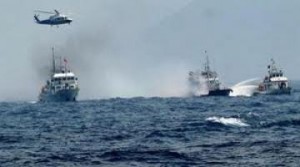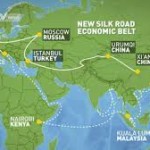 The last few years have seen tensions rise between China and its neighbors in the East and South China Seas. This large maritime region is host to several overlapping territorial claims and straddles important sea lanes. Interest in the potential hydrocarbon resources of these seas has grown as import requirements for oil and gas have increased, especially in China. Estimates by the US Geological Survey suggest that the recoverable reserves are likely to be modest in comparison with the scale of regional demand. Published Chinese estimates are much larger. China’s behavior in these seas over the last few years reflects an internal tension between those who wish to secure the nation’s economic and sovereign interests and those who wish to present China as a responsible international citizen. Its behavior and rhetoric is also influenced by the actions and statements of other littoral states as well as of the USA.
The last few years have seen tensions rise between China and its neighbors in the East and South China Seas. This large maritime region is host to several overlapping territorial claims and straddles important sea lanes. Interest in the potential hydrocarbon resources of these seas has grown as import requirements for oil and gas have increased, especially in China. Estimates by the US Geological Survey suggest that the recoverable reserves are likely to be modest in comparison with the scale of regional demand. Published Chinese estimates are much larger. China’s behavior in these seas over the last few years reflects an internal tension between those who wish to secure the nation’s economic and sovereign interests and those who wish to present China as a responsible international citizen. Its behavior and rhetoric is also influenced by the actions and statements of other littoral states as well as of the USA.
From the perspective of the US and its friends and allies in Asia, there are a number of troubling elements that derive from Chinese behavior. First, the growth of Chinese maritime capabilities poses a threat to US access from the West Pacific to the Indian Ocean in times of crisis. This would be especially serious if there were a conflict with China over Taiwan. Chinese sea denial potential, paralled by its claims of sovereignty over large swathes of both the South and East China Seas, also threatens the United Nations Convention on the Law of the Seas (UNCLOS) upon which the freedom of transit through narrow sea ways and straits has been guaranteed for the past thirty years. But perhaps the most worrying development is that the rise of China’s maritime power coincides with the inevitable downsizing of the global US military presence and it capacity to act as de facto policeman for freedom of the seas in all major maritime arenas. This is of major concern to most of the regional powers in the Pacific and South East Asia. To reassure allies, the Obama administration announced the establishment of a new military base in Darwin. But the reality is the local powers, including Japan, India, Indonesia, South Korea and the Philippines are all expanding their military capabilities and will thus play a larger role in maritime defense, including efforts to limit China’s regional dominance, than in the past. Future US maritime strategy will therefore have to be more closely coordinated with regional allies than in the past. This could mean difficult compromises about threats, responses and priorities.



